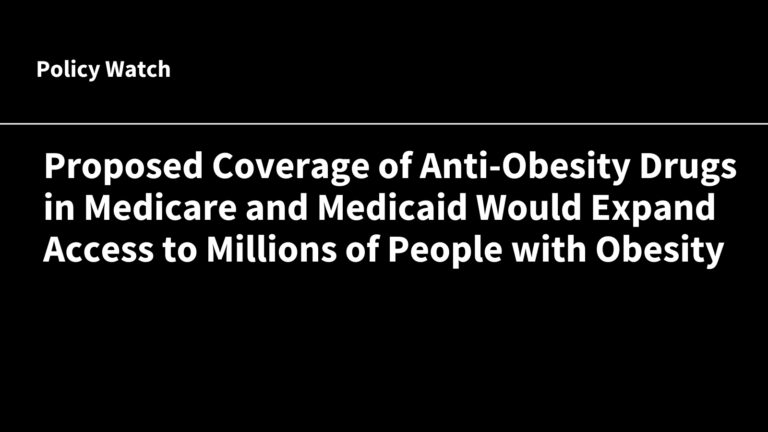
rewrite this content and keep HTML tags
The Biden administration has proposed to allow Medicare and require Medicaid to cover drugs used to treat obesity by reinterpreting the statutory language that currently prohibits coverage of drugs used for weight loss under Medicare and permits but does not require states to cover these drugs for weight loss under Medicaid. This reinterpretation reflects an evolution in the understanding of obesity as a disease and weight loss as conferring real health benefits in people with obesity rather than being merely for cosmetic purposes. It also comes amidst high and growing demand for and use of a relatively new class of highly effective, but also very expensive, drugs being used to treat obesity, known as GLP-1s.
Under current law, people on Medicare can get anti-obesity drugs covered by Part D, Medicare’s outpatient drug benefit, only if they are used for a medically accepted FDA-approved indication other than obesity, like diabetes or cardiovascular disease risk reduction. State Medicaid programs also have to cover these drugs for indications such as diabetes or cardiovascular disease risk reduction, but only 13 states currently cover these drugs for obesity treatment as well. These limitations on coverage in Medicare and Medicaid mean that millions of people who have obesity and might benefit from these drugs may be unable to access them due to their high prices. But even with these coverage limits in place, gross spending on these drugs for approved uses in Medicare and Medicaid has skyrocketed in recent years, totaling $4 billion in Medicaid in 2023 and close to $6 billion in Medicare in 2022 for selected GLP-1s.
The new Biden administration proposal would authorize Medicare and Medicaid coverage of anti-obesity medications for people with obesity but not people who are overweight. While coverage would be available for Medicare and Medicaid enrollees with obesity, Medicare Part D drug plans and state Medicaid programs could still apply utilization management tools such as prior authorization, which could limit access. According to the Centers for Medicare & Medicaid Services, the proposal would increase Medicare spending by $25 billion and Medicaid spending by $15 billion over 10 years (net of rebates) and would apply to around 3.4 million people with Medicare and 4 million people with Medicaid. Because Medicaid is jointly financed by the states and the federal government, CMS estimates the federal government would pay $11 billion and states would pay nearly $4 billion.
Rising prescription drug costs are an ongoing concern for states, and state Medicaid programs reported the high cost of obesity drugs as key reason for not expanding coverage prior this proposal. The potential cost to Medicare is lower than some other estimates because it assumes many people with obesity can already get Medicare coverage of these drugs for other medically accepted indications, and CMS’s proposal would not apply to people who are overweight. Nonetheless, the combination of high demand, new uses, and high prices for these treatments is likely to place tremendous pressure on Medicare spending, Part D plan costs, and premiums for Part D coverage over time.
KFF analysis has found most large employer firms currently do not cover GLP-1 drugs for weight loss and coverage in ACA Marketplace plans remains limited, but if finalized, the proposed change to Medicare and Medicaid coverage could put pressure on other payers to expand access. If it becomes official coverage policy, this change would also lift the burden off lawmakers in Congress who have repeatedly introduced legislation to authorize Medicare coverage of anti-obesity drugs but who may have been stymied by the potential cost of doing so. But as the Biden administration prepares to hand the reins over to the incoming Trump administration, a key question is whether the rule will be finalized as proposed under new leadership at CMS, changed in some way, or pulled back altogether.